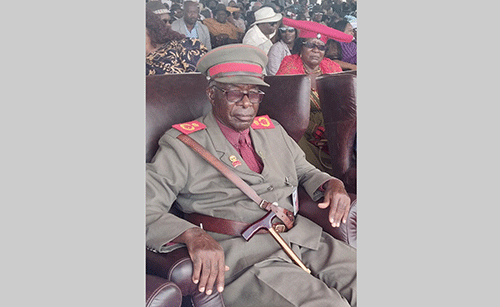AMINUIS – The Ovaherero Traditional Authority (OTA)’s Aminuis senior traditional counsellor Bethold Tjiundje has praised the late President Hage Geingob for his vision and work he did at Chief Hosea Kutako’s homestead.
Geingob was the mastermind behind the newly-inaugurated Chief Hosea Kutako Memorial Museum and Homestead Shrine at Toasis village in the Omaheke region’s Aminuis constituency.
Speaking at the unveiling of the shrine on Tuesday by President Nangolo Mbumba, Tjiundje said the late Geingob was a true Namibian nationalist and a patriot par excellence.
He said Geingob had a vision for the shrine and the memorial museum in honour of Chief Kutako ,and worked tirelessly to ensure its successful completion.
“Dr Geingob used to describe himself as part of a new breed of African leaders inclusive in their governance and committed to the advancement of all citizens. His motto, as you may recall, was about ‘Building a Namibian House in which no one was left behind’,” Tjiundje said.
The senior counsellor added that the late president did not build a shrine in his own honour in a village somewhere in the Otjozondjupa region.
“He did not go and build a shrine in honour of the late Chief [David] Goreseb, who was a notable feature in Namibia’s resistance struggle. He came to build this shrine in Toasis, thus asserting a common Namibian nationhood with a shared history as espoused by Chief Kutako. We honour and salute him – may his soul rest in peace,” added the Aminuis counsellor.
Tjiundje thanked President Mbumba for rising to the occasion at a most challenging time for himself and the nation – when Geingob died.
“Through you, I want to thank the Namibian government and fellow Namibians for this investment in Toasis. It is a significant investment whose return is not and cannot be measured in terms of money. The cultural and socio-economic multiplier effects of this investment are immeasurable, and will stand the test of time,” he said.
Tjiunde also told Mbumba that he can count on the OTA to be a partner in furthering the agenda of unity in diversity, natural resources beneficiation and youth empowerment for sustainable development.
“It is indeed an enormously powerful agenda that requires all of us, in our diversity, to participate and benefit meaningfully in the value chain of our natural resources, and to empower the youth as the ultimate heirs of those resources,” he said.
-Nampa



